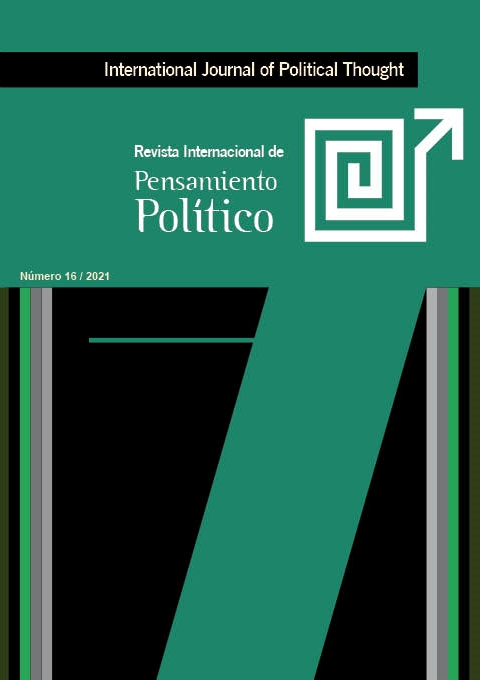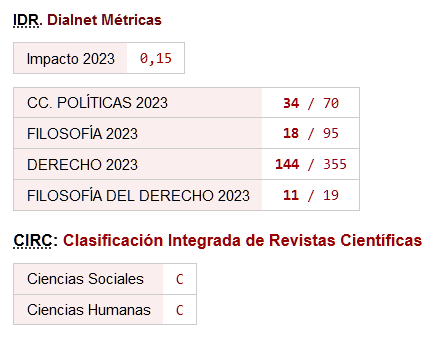The common-indigenous in the face of globalization. Plots to understand the struggles for decolonization
DOI:
https://doi.org/10.46661/revintpensampolit.6078Keywords:
colonialism, indigenous communs, rights of Nature, interculturalityAbstract
The objective of this work was to measure the expropriating and destructive character that colonialism has had and still has on the reality of indigenous peoples, and how colonialism continues to cast its shadows of destruction globally in times of ecological annihilation. We consider the indigenous-commons as the nucleus from which to understand the proposal of transformation and community resistance of indigenous peoples; the place that gives foundation and meaning to their political practice of rights. We have moved towards a political critique of the concept of Rights of Nature, in a double sense: as a critique of what it is not, of its misrepresentation by the State; as an alternative proposal to understand the centrality that the ecology of living beings has in indigenous worldviews. Finally, we conclude with what we consider the main fractures in the protection of indigenous rights, gaps that ultimately rest on the need to annul and destroy the indigenous understanding of life (s) due to the critical potential that they imply for the new colonial reason.
Downloads
References
Acosta A. y Martinez E. (2011) La naturaleza con derechos. De la filosofía a la política, Quito, Abya Yala.
Bhaba, H. (1994) The location of Culture, New York, Routledge.
Bollier, D. (2016) Pensar desde los comunes. Una breve introducción, Madrid, Traficantes de sueños.
Chakrabarty, D. (2000) Al margen de Europa. Pensamiento poscolonial y diferencia histórica, Barcelona, TusQuets.
Chakrabarty, D. (2009) "The Climate of History: Four Theses", Critical Enquiry, 35, pp. 197-222.
https://doi.org/10.1086/596640
Chakrabarty, D. (2012) "Postcolonial Studies and the Challenge of climate Change", New Literary History, 43:1, pp. 1-18.
https://doi.org/10.1353/nlh.2012.0007
Chilisa and Ntseane P. (2010) "Resisting dominant discourses: Impications of Indigenous African Feminist Theory and Methods for Gender and Education Research", Gender and Education, 22 (6), 617-631.
https://doi.org/10.1080/09540253.2010.519578
Cram F. (2009) "Manteining indigenous voices" in Mertens D. M. y Ginsberg P. E. (ed.) The Handbook of social research ethics, CA, Sage, pp. 308-322.
https://doi.org/10.4135/9781483348971.n20
Cabnal, L. (2017). Tzk'at, Re de Sanadoras Ancestrales del Feminismo Comunitario desde Iximulew-Guatemala. Ecología Política, 54, 100-104.
CIDH, (2015) Pueblos indígenas, comunidades afrodescendientes y recursos naturales: protección de derechos humanos en el contexto de actividades de extracción, explotación y desarrollo, OEA.
Danowski D. y Viveiro de Castro E. (2019) ¿Hay un mundo por venir? Ensayo sobre los miedos y los fines, Buenos Aires, Futuros Próximos.
Davison, D. (2004) "A Unified Theory of Thought, Meaning and Action", in Problems of Rationality, Oxford, OUP.
https://doi.org/10.1093/0198237545.003.0010
Descola, P. (2012) Más allá de naturaleza y cultura, Barcelona, Amorrortu.
Guerrero P. (2018) La chakana del corazonar. Desde las espiritualidades y las sabidurías insurgentes de Abya Yala, Quito, Abya Yala.
Hess, Ch. y Ostrom, E. (eds.) (2016) Los bienes comunes del conocimiento, Quito, IAEN.
Kohn E. (2021) Cómo piensan los bosques, Quito, Abya Yala.
Fao y Filac (2021) Los pueblos indígenas y tribales y la gobernanza de los bosques. Una oportunidad para la acción climática en América Latina y el Caribe, Santiago, FAO.
González G. y Lincoln Y. (2006) "Decolonizing qualitative research: Nontraditional forms in academy", Forum: Qualitative Social Research, 7 (4), pp. 1-14.
Goody J. (2021) El robo de la Historia, Madrid, Akal.
Gudynas E. (2011) "Los derechos de la naturaleza en serio" en Acosta A. y Martínez E. (2011) La naturaleza con derechos. De la filosofía a la política, Quito, Abya Yala, pp. 239-286.
Gudynas E. (2014) Derechos de la naturaleza. Ética biocéntrica y políticas ambientales, Perú, PDTG.
Gudynas E. (2015) Extractivismos. Ecología, economía y política de un modo de entender el desarrollo y la naturaleza, Bolivia, CEDIB.
Honneth A. (2011) La sociedad del desprecio, Madrid, Trota.
Latour, B. (2012) "Esperando a Gaia. Componer el mundo común mediante las artes y la política", Cuadernos de Otra parte. Revista de letras y artes, n º26, pp. 67-76.
Latour, B. (2017) Cara a Cara con el Planeta. Una nueva mirada sobre el cambio climático alejada de posiciones apocalípticas, Buenos Aires, Siglo XXI.
Latour, B. (2019) Dónde aterrizar. Cómo orientarse en política, Madrid, Taurus.
Leanui, P. (2000) "Processes of descolonization" en Batisse M (ed.) Reclaiming indigenous voice and vision, Toronto, UBC Press, pp. 150-160.
Marko, I. (2017) Contrepoints.org.
Martínez de Bringas A. (2016) "La política de lo común. Experiencias y sabidurías para el Buen Vivir", Pensamiento, Vol. 72 nº 272, pp. 593-616.
https://doi.org/10.14422/pen.v72.i272.y2016.007
Martínez de Bringas A. (2011) "Naturaleza de la(s) autonomía(s) indígena(s) en el marco de la Constitución boliviana: Una reflexión sobre el contenido de los derechos indígena", Revista general de derecho público comparado, Nº. 9, págs. 1-20.
Martínez de Bringas A. (2018): "Autonomías indígenas en América Latina. Una mirada comparada a partir de las dificultades para la construcción de un Derecho intercultural", Revista d'estudis autonòmics i federals, 28, pp. 101-138.
Martínez de Bringas A. (2020) "El reconocimiento del genocidio como estrategia instituyente para la reparación de los derechos colectivos y la memoria indígena" en Sánchez Rubio D. y Zúñiga P. (eds.) Poderes constituyentes, alteridad y derechos humanos. Miradas críticas a partir de lo instituyente, lo común y los pueblos indígenas, Madrid, Dykinson, pp. 193-240.
https://doi.org/10.2307/j.ctv1dp0w7k.7
Naess A. y Sessions G. (1985) "Platform principles of the deep ecology movement", pp 69-73, in Devall B. y Sessions G. (eds.) Deep ecology: living as if Nature mattered, Salt Lake City, Smith.
Oreskes, N. y Conway E. (2010) Merchants of doubt. How a Handful of Scientists Obscured the Truth on Issues from Tobacco Smoke to Global Warming, Bloomsbury Press.
Paredes J. (2015) "Despatriarcalización. Una respueta categórica del feminismo comunitario (descolonizando la vida)", Revista de Estudios Bolivianos, vol. 21, pp. 100-115.
https://doi.org/10.5195/BSJ.2015.144
Quine, W.V.O. (2013) World and Object, Cambridge, MIT Press.
https://doi.org/10.7551/mitpress/9636.001.0001
Riechmann, J. (2019) Otro fin del mundo es posible, decían los compañeros. Sobre transiciones ecosociales, colapsos y la imposibilidad de lo necesario, Barcelona, MRA.
Santos, B. (2009) Una epistemología del sur: la reinvención del conocimiento y la emancipación social, México, Siglo XXI.
Santos, B. (2019) El fin del imperio cognitivo. La afirmación de las epistemologías del Sur, Madrid, Trotta.
Svampa, M. (2018) Las fronteras del neo-extractivismo en América Latina. Conflictos socio ambientales, giro eco territorial y nuevas dependencias, México, Universidad de Guadalajara.
https://doi.org/10.14361/9783839445266
Tzul G. (2018) Sistemas de gobierno comunal indígena. Mujeres y tramas de parentesco en Chuime'ena', México, Amaq.
https://doi.org/10.2307/j.ctvnp0k5d.19
Viveiros de Castro E. (1998) "Cosmological deixis and Ameridian perspectivism", Journal of the Royal Antropological Institute, 4, (3), pp. 469-488.
https://doi.org/10.2307/3034157
Viveiros de Castro E. (2010) Metafísicas caníbales. Líneas de antropología postestructural, Madrid, Katz.
Downloads
Published
How to Cite
Issue
Section
License
Copyright (c) 2022 asier martinez de bringas

This work is licensed under a Creative Commons Attribution-NonCommercial-ShareAlike 4.0 International License.
Open access policy
Free and open access is allowed to any interested party to all the contents of the journal issues, free of charge, being able to print and transfer all the articles, with the only condition of specifying the source and authorship.
The journal: a) does not charge authorship costs for the processing of articles or for their submission, b) maintains copyright for authors without restrictions, c) facilitates authors to keep their publication rights without limitations.
The International Journal of Political Thought is an original work of the Laboratory of Political Ideas and Practices of the Pablo de Olavide University. All articles included in the Journal are original work of their respective authors. This Journal is freely offered to the scientific and academic community at no cost and releases the contents according to the license "Attribution-NonCommercial-ShareAlike 4.0 CC BY-NC-SA" of the Creative Commons project available in the following url: https://creativecommons.org/licenses/by-nc-sa/4.0/legalcode
If you wish to translate or compile any of the articles available here, please contact us at contacto












 ISSN: 1885-589X
ISSN: 1885-589X  Universidad Pablo de Olavide
Universidad Pablo de Olavide